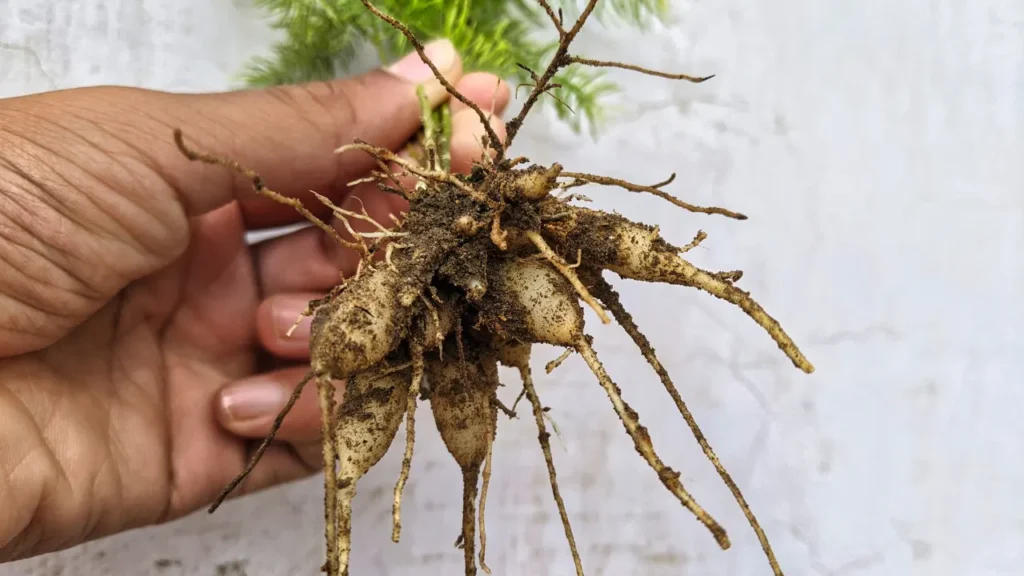The climbing plant asparagus racemosus, also referred to as “shatavari,” is a member of the asparagus genus and is indigenous to Sri Lanka, India, and Nepal. Asparagus racemosus has been historically valued in Ayurvedic medicine for its range of health advantages, including its immunostimulatory, adaptogenic, and antioxidant properties. The nature of asparagus racemosus, its health advantages, the best dosage, any potential negative effects, any possible drug interactions, and other pertinent information are all covered in this article.
You May Also Like:
5 Great Nootropic Herbs for Energy, Focus, and Productivity
A Nootropic Herb for Cognitive Enhancement: Discover Bacopa Monnieri Benefits and Side Effects
Asparagus Racemosus: Benefits, Dosage, Side Effects, Drug Interactions, And Other Important Information is an original (NootropicsPlanet) article.
The Nature of Asparagus Racemosus
Asparagus is a perennial climbing plant that has delicate branches and tiny white flowers. The plant has long, tapering, tuberous roots that are the main source of its medicinal properties. A variety of bio-active substances, including steroidal saponins, flavonoids, glycosides, and mucilage, are present in the roots and are what give rise to the plant’s varied pharmacological effects.
Health Benefits of Asparagus Racemosus
Adaptogenic Properties
As an adaptogen, asparagus racemosus helps the body to adjust to a variety of stresses, whether they are biological, chemical, or physical. The hypothalamic-pituitary-adrenal (HPA) axis, which controls how the body responds to stress, is known to be modulated by adaptogens. Asparagus racemosus contains steroidal saponins, including shatavarin I and shatavarin IV, which are thought to be a portion of its adaptogenic abilities. In animal trials, these substances showed a protective effect against stress-induced metabolic alterations, such as increased cortisol levels.
Activity of Antioxidants
Due to flavonoids and other phenolic components found in the plant, asparagus racemosus demonstrates strong antioxidant activity. These substances prevent oxidative damage to biological components by neutralizing reactive oxygen species (ROS). There is evidence that asparagus racemosus can aid in the prevention of the development and progression of oxidative stress-related disorders due to its antioxidant activity, which has been shown in several in vitro and in vivo investigations.
Effects on Immunomodulation
Asparagus racemosus’s immunomodulatory properties have been thoroughly researched in both in vitro and in vivo studies. The steroidal saponins and polysaccharides of the plant have been demonstrated to improve immune system performance by inducing cytokine synthesis, boosting phagocytic activity, and encouraging lymphocyte proliferation. These immunomodulatory properties can explain why the plant can potentially be useful in treating a variety of immune-related conditions, including cancer and autoimmune diseases.
Health of Female Reproduction
Supporting female reproductive health is one of asparagus racemosus’ most well-known uses in traditional medicine. Steroid saponins from the plant have been proven to have estrogenic properties, which can help control hormonal imbalances and lessen menopausal symptoms including hot flashes and mood swings. Additionally, asparagus racemosus has shown to have a galactagogue effect, which increases breastfeeding mothers’ ability to produce milk.
Health of the Digestive System
Due to its demulcent and anti-ulcer properties, asparagus racemosus has long been used to support gastrointestinal health. The plant’s mucilage content is believed to be essential in preserving the gastrointestinal mucosa and relieving symptoms of gastrointestinal illnesses like gastritis and peptic ulcers.

Chemistry of Asparagus Racemosus
Diverse bio-active substances found in asparagus racemosus contribute to its pharmacological characteristics. Among the plant’s main active ingredients are some of the following:
Synthetic Saponins
The main bio-active components in asparagus racemosus are steroidal saponins like Shatavarin I and IV. These substances possess immunomodulatory, adaptogenic, and estrogenic effects.
Flavonoids
A class of phenolic chemicals known as flavonoids have strong antioxidant capabilities. The flavonoids in asparagus racemosus contribute to the plant’s ability to scavenge free radicals and shield cells from oxidative stress.
Polysaccharides
Complex carbohydrates called polysaccharides have immunomodulatory effects. Polysaccharides have been found to stimulate the immune system in asparagus racemosus by encouraging lymphocyte proliferation and boosting phagocytic activity.
Mucilage Mucilage
This is a viscous material with demulcent qualities, is abundant in the roots of asparagus racemosus. This substance provides symptomatic alleviation for gastrointestinal problems by protecting the gastrointestinal mucosa.
Physiological Properties of Asparagus Racemosus
To have an impact on the body and brain, asparagus racemosus’ bio-active substances interact with a number of physiological systems. Some of the main mechanisms of action are as follows:
Changes in the HPA Axis
As an adaptogen, asparagus racemosus works to control the body’s primary stress response mechanism, the hypothalamic-pituitary-adrenal (HPA) axis. Steroid saponins from the plant assist the body adapt to different stresses and keep homeostasis by modifying the HPA axis.
Oxidative Mechanisms
Reactive oxygen species (ROS) are neutralized by the flavonoids in asparagus racemosus, preventing oxidative damage to biological components. This antioxidant activity may aid in delaying the start and progression of a number of disorders linked to oxidative stress.


Optimal Dosage of Asparagus Racemosus
The ideal dosage of asparagus racemosus depends on a number of variables, including your age, overall health status, and the particular health issue being treated. Asparagus racemosus root extract is often taken in quantities of 500 to 1000 mg per day, divided between two or three meals. However, as individual needs can differ, it is crucial to speak with a healthcare expert before beginning any new supplement program.
Side Effects of Asparagus Racemosus
When used in the recommended quantities, asparagus racemosus is thought to be safe for the majority of people. However, some possible negative effects could manifest, especially in sensitive people or when ingested in excess. Gastrointestinal distress, diarrhea, and allergic responses are possible side effects. Before consuming asparagus racemosus, pregnant women and anyone with a history of estrogen-sensitive diseases like breast, uterine, or ovarian cancer should use caution and speak with a healthcare provider because its estrogenic properties can be harmful in these circumstances.


Potential Substance Interactions
As with any dietary supplement, asparagus racemosus can interact with specific drugs and chemicals. The following are some potential interactions to be aware of even if research on asparagus racemosus-drug interactions is limited:
Anti-platelet and Anticoagulant Medications
Due to its potential blood-thinning effects, asparagus racemosus can raise the risk of bleeding when combined with anticoagulant and anti-platelet drugs like warfarin, aspirin, or clopidogrel. Before taking asparagus racemosus along with these medications, it is imperative to speak with a medical expert.
Diuretics
Asparagus racemosus may be a diuretic, which can help diuretic drugs like furosemide or hydrochlorothiazide work more effectively. An increased risk of electrolyte imbalances or dehydration can result from this combination. A healthcare provider should be consulted by anyone taking diuretics.
Estrogenic Properties
Asparagus racemosus, which possesses estrogenic properties, can interact with hormonal contraceptives or hormone replacement therapy (HRT), as was previously mentioned. In order to prevent hormonal imbalances or decreased medication effectiveness, people taking estrogenic prescriptions should speak with a healthcare provider before using asparagus racemosus.
Responsible Use of Asparagus Racemosus
Asparagus racemosus has many health advantages, but they must be used responsibly to prevent unwanted consequences or interactions. These consist of:
Consultation with a Medical Expert
Consult with a trained healthcare expert before beginning a new supplement regimen, including one containing asparagus racemosus, to be sure it is appropriate for your unique needs and to establish the best dosage.
Purchasing Premium Supplements
To assure the purity, potency, and security of their products, choose asparagus racemosus supplements from renowned producers who follow good manufacturing practices (GMP) and offer third-party testing.
Observing Suggested Dosages
Follow the asparagus racemosus supplement manufacturer’s or your healthcare provider’s recommendations for dosing. The risk of side effects or interactions can rise with excessive usage.
Monitoring for Interactions and Side Effects
When using asparagus racemosus, be watchful for any possible side effects or interactions, especially if you also use other drugs or dietary supplements. Consult a medical expert right away if you suspect any negative effects or interactions.
Asparagus Racemosus:
Conclusion
Asparagus Racemosus is very beneficial to overall health in terms of being used as a diuretic, and especially for its estrogenic properties. However, there are still high potential for severe or mild side effects. Be sure to talk to a doctor before consuming or starting any kind of asparagus racemosus supplement.


References:
- Pharmacological review of Asparagus racemosus. Retrieved from: https://www.researchgate.net/profile/Debasis-Panda/publication/282786324_Pharmacological_review_of_Asparagus_racemosus/links/5620f9b208ae246e58aae399/Pharmacological-review-of-Asparagus-racemosus.pdf
- Pharmacological review of Asparagus racemosus. Retrieved from: https://www.researchgate.net/publication/282786324_Pharmacological_review_of_Asparagus_racemosus
Important Note: The information contained in this article is for general informational purposes only, and should not be construed as health or medical advice, nor is it intended to diagnose, prevent, treat, or cure any disease or health condition. Before embarking on any diet, fitness regimen, or program of nutritional supplementation, it is advisable to consult your healthcare professional in order to determine its safety and probable efficacy in terms of your individual state of health.
Regarding Nutritional Supplements Or Other Non-Prescription Health Products: If any nutritional supplements or other non-prescription health products are mentioned in the foregoing article, any claims or statements made about them have not been evaluated by the U.S. Food and Drug Administration, and such nutritional supplements or other health products are not intended to diagnose, treat, cure, or prevent any disease.
